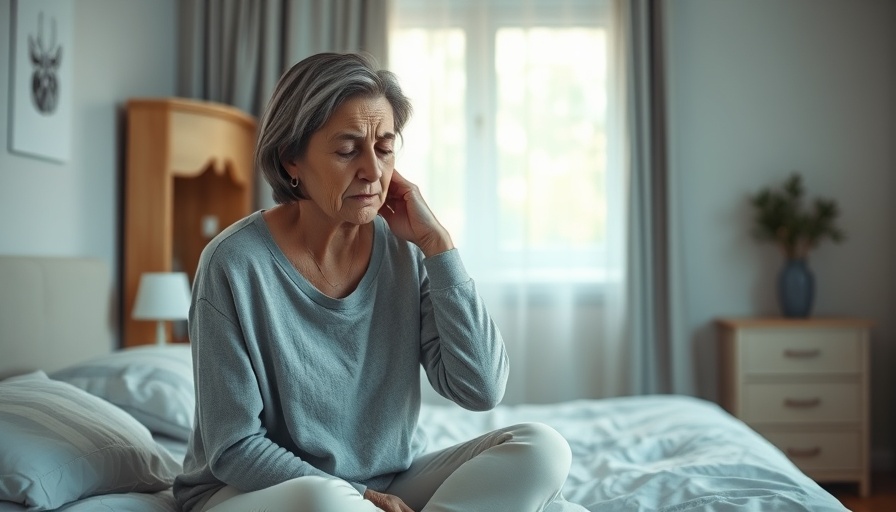
Diving into the Intersection of Menopause and Crohn’s Disease
For many women, the transition into menopause brings with it an entire array of changes, both physically and emotionally. It's a time when hormonal shifts can influence various aspects of health—including conditions like Crohn's disease. While research on this specific connection is still limited, experts agree that understanding the interplay between menopause and Crohn’s can significantly improve holistic care for women facing these challenges.
Understanding Menopause and its Symptoms
Menopause marks the end of a woman’s reproductive years, typically occurring between the ages of 45 and 55. During this period, the body undergoes significant hormonal changes, particularly decreases in estrogen and progesterone. These hormonal fluctuations can lead to a range of symptoms, including hot flashes, mood swings, and joint pain. For women with Crohn's disease—an inflammatory bowel condition—these changes may exacerbate gastrointestinal symptoms and overall well-being.
Hormonally Driven Symptoms: The Link Between Menopause and Crohn's
Research has shown that women's Crohn's symptoms can fluctuate with their menstrual cycles, suggesting that hormonal balance plays a crucial role in gut health. Dr. Omar Khokhar highlights this connection, explaining how estrogen and progesterone influence "immune regulation and gut motility." This insight underlines why symptoms of Crohn's may intensify during menopause, a time when these hormone levels dip considerably.
Validating Women’s Experiences: A Call for Better Coordination in Care
One compelling point raised by Dr. Ekta Gupta, chief of gastroenterology at the University of Maryland Medical Center, is the importance of validating patients' experiences. Many women have shared feelings of being dismissed when discussing how menopause compounds their gastrointestinal symptoms. This lack of understanding suggests a need for improved dialogue between healthcare providers and patients, potentially leading to more effective management strategies tailored to individual experiences.
New Strategies for Coping: Empowering Women through Awareness
Embracing the connection between menopause and Crohn’s disease opens the door to strategic coping mechanisms. For women diagnosed with Crohn's, awareness of their symptoms can empower them to seek out appropriate treatments. Simple lifestyle adjustments can also help mitigate discomfort—regular physical activity can reduce stress and improve mood, while a balanced diet rich in anti-inflammatory foods may alleviate some digestive symptoms.
The Power of Community: Shared Experiences in Central Ohio
Living in Central Ohio, many women can benefit from community support and resources focused on wellness. Local women’s health groups often provide valuable insights through shared experiences, combining medical advice with personal anecdotes. Attending workshops, support groups, or accessed online resources can maintain a sense of connection while navigating the complexities of menopause and chronic conditions like Crohn’s disease.
Future Directions: Trends in Treatment and Research
As medical research continues to evolve, the link between menopause and Crohn's disease may receive the attention it deserves. Increased funding for studies focused on women's health can illuminate how hormonal changes contribute to flare-ups and affect overall health outcomes. Encouragingly, such research could lead to tailored treatments that are more effective for women experiencing both menopause and Crohn's.
How to Advocate for Yourself: Taking Control of Your Health Care
Women experiencing the dual challenges of menopause and Crohn's disease should feel empowered to advocate for their health. This may involve seeking second opinions, tracking symptoms to identify patterns, and being vocal about their experiences with healthcare providers. Empowerment comes from understanding one’s body and proactively seeking the necessary care.
In conclusion, exploring the intersection of menopause and Crohn’s disease is crucial for supporting women's health in Central Ohio and beyond. By equipping oneself with knowledge, connecting with others, and advocating for oneself, women can navigate these changes with greater ease and control.
If you or a loved one is dealing with menopause and Crohn's disease, consider reaching out to local health resources for support. You deserve a health journey filled with understanding and community encouragement.
 Add Row
Add Row  Add
Add 




Write A Comment